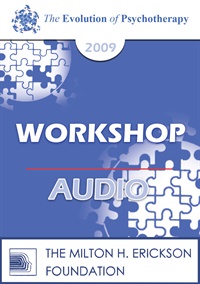
- Average Rating:
- Not yet rated
- Topic Areas:
- Couples Therapy | Workshops | Affairs | Infidelity | Psychotherapy
- Categories:
- Evolution of Psychotherapy | Evolution of Psychotherapy 2009
- Faculty:
- Michele Weiner-Davis, LCSW
- Duration:
- 2 Hours 11 Minutes
- Format:
- Audio Only
- Original Program Date:
- Dec 09, 2009
- Short Description:
- Few couples seem as unlikely to profit from therapy as those in which one partner as already decided to leave. Yet, even at this point, a therapist has an opportunity to turn the situation around. In this workshop, you will learn how to step in, even at the 11th hour, and help couples with seemingly intractable problems – hopelessness, ongoing affairs, and one spouse’s unwillingness to seek therapy, to resolve their difficulties, recommit to their marriage, and reclaim their lives.
- Price:
- $15.00 - Base Price
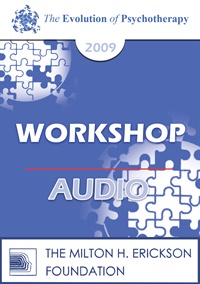
- Average Rating:
- Not yet rated
- Topic Areas:
- Workshops | Psychotherapy | Therapist Development
- Categories:
- Evolution of Psychotherapy | Evolution of Psychotherapy 2009
- Faculty:
- Scott Miller, PhD
- Duration:
- 2 Hours 51 Minutes
- Format:
- Audio Only
- Original Program Date:
- Dec 09, 2009
- Short Description:
- Thanks to a number of recent studies, there is now solid empirical evidence for what distinguishes highly effective therapists.In this workshop, participants will learn in detail the qualities and practices that separate the great from the good. Participants also will find out about a system of feedback procedures that can be used to develop a profile of their most and least effective moments in therapy – what works and what doesn’t. Not only will attendees get a far more exact idea of their clinical strengths and weaknesses, and how to use the findings in which to improve their own practice, but they also will come away with concrete tools that will immediately boost clinical abilities and effectiveness.
- Price:
- $15.00 - Base Price
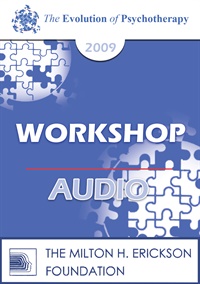
- Average Rating:
- Not yet rated
- Topic Areas:
- Psychotherapy | Workshops | Brief Therapy | Neuroscience
- Categories:
- Evolution of Psychotherapy | Evolution of Psychotherapy 2009
- Faculty:
- Ernest Rossi, PhD
- Duration:
- 1 Hour 46 Minutes
- Format:
- Audio Only
- Original Program Date:
- Dec 09, 2009
- Short Description:
- Neuroscience implies creative activity in art, science, dreaming, meditation, therapeutic hypnosis, and psychotherapy can turn on activity-dependent gene expression and brain plasticity to facilitate positive human transformations. A variety of group processes will explore Rossi’s Novel Activity-Dependent hand Mirroring Approaches to Erickson’s General Waking Trance during brief psychotherapy.
- Price:
- $15.00 - Base Price
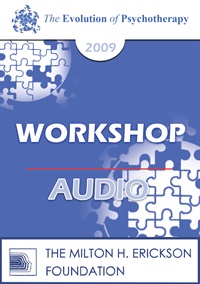
- Average Rating:
- Not yet rated
- Topic Areas:
- Trauma | Post-Traumatic Stress Disorder (PTSD) | Workshops | Psychotherapy
- Categories:
- Evolution of Psychotherapy | Evolution of Psychotherapy 2009
- Faculty:
- Donald Meichenbaum, PhD
- Duration:
- 2 Hours 22 Minutes
- Format:
- Audio Only
- Original Program Date:
- Dec 09, 2009
- Short Description:
- Dr. Meichenbaum will discuss the “State of the Art” in treating PTSD and use videos to demonstrate how to conduct integrative treatment intervention. He will highlight the value of a Constructive Narrative Perspective. Finally, some 300,000 soldiers are returning from combat with PTSD and comorbid disorders. Dr. Meichenbaum will address their needs and discuss ways to bolster resilience. (see www.warfighterdiaries.com)
- Price:
- $15.00 - Base Price
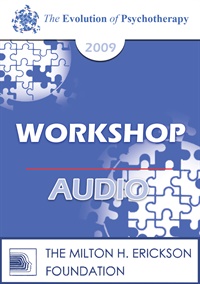
- Average Rating:
- Not yet rated
- Topic Areas:
- Couples Therapy | Workshops | IMAGO | Intimacy | Psychotherapy
- Categories:
- Evolution of Psychotherapy | Evolution of Psychotherapy 2009
- Faculty:
- Harville Hendrix, PhD
- Duration:
- 2 hours 55 minutes
- Format:
- Audio Only
- Original Program Date:
- Dec 09, 2009
- Short Description:
- In this workshop, using lectures, demonstrations and practice, participants will distinguish between the individual and relational paradigm, and learn how to use the Imago Dialogue Process to help couples create a conscious partnership in which difference is accepted, conflict is transformed into creative tension, love is born and sustained, and personal healing and growth are facilitated.
- Price:
- $15.00 - Base Price
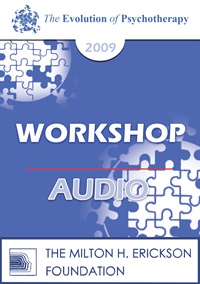
- Average Rating:
- Not yet rated
- Topic Areas:
- Workshops | Relationships | Psychotherapy
- Categories:
- Evolution of Psychotherapy | Evolution of Psychotherapy 2009
- Faculty:
- Cloe Madanes, HDL, LIC
- Duration:
- 2 Hours 21 Minutes
- Format:
- Audio Only
- Original Program Date:
- Dec 09, 2009
- Short Description:
- Cloé Madanes will present a theoretical framework and tools that therapists can use to understand what relationships need to change in order to solve the problem presented to therapy. Madanes will present 20 of her favorite strategies illustrated with case examples and with experiential exercises.
- Price:
- $15.00 - Base Price
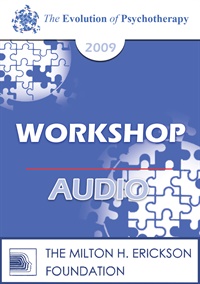
- Average Rating:
- Not yet rated
- Topic Areas:
- Depression | Workshops | Hypnosis | Experiential Therapy | Psychotherapy | Strategic Therapy
- Categories:
- Evolution of Psychotherapy | Evolution of Psychotherapy 2009
- Faculty:
- Michael Yapko, PhD
- Duration:
- 2 Hours 42 Minutes
- Format:
- Audio Only
- Original Program Date:
- Dec 09, 2009
- Short Description:
- Despite the common framing of depression as a medical illness, there is much more hard evidence pointing to social factors leading to the large and still growing population of depression sufferers. In this presentation, the focus will be on the social factors that lead to and exacerbate depression. How therapy, itself a social process, can make use of hypnotic and strategic approaches to experientially teach skills known to reduce and even prevent depression will be explored.
- Price:
- $15.00 - Base Price
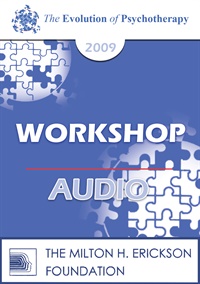
- Average Rating:
- Not yet rated
- Topic Areas:
- Neuroscience | Psychology | Workshops | Meditation, Spirituality and Yoga | Mindfulness | Buddhism | Psychotherapy | Attunement
- Categories:
- Evolution of Psychotherapy | Evolution of Psychotherapy 2009
- Faculty:
- Jack Kornfield, PhD | Daniel Siegel, MD
- Duration:
- 2 Hours 50 Minutes
- Format:
- Audio Only
- Original Program Date:
- Dec 09, 2009
- Short Description:
- There is a vast wisdom describing the capacity for self-transformation and healing central to Buddhist psychology, now a focus of current neuroscience research as well. We will delineate the principles and clinical/therapeutic applications of mindfulness, compassion and forgiveness trainings, attunement, mental health and well being, as well as the profound shift of identity that has parallels in eastern psychology and recent neuroscience research. We will explore the wedding of a spiritual psychology of the heart in tune with clinically sound modern science.
- Price:
- $15.00 - Base Price

- Average Rating:
- Not yet rated
- Topic Areas:
- Workshops | Psychotherapy
- Categories:
- Evolution of Psychotherapy | Evolution of Psychotherapy 2009
- Faculty:
- David Barlow, PhD
- Duration:
- 2 Hours 48 Minutes
- Format:
- Audio Only
- Original Program Date:
- Dec 10, 2009
- Short Description:
- This workshop will review the evidence supporting and discussing recent applications of a transdiagnostic, unified, cognitive behavioral and emotion focused approach to treating emotional disorders. Participants will learn how to apply treatment components organized in modules to a wide range of emotional disorders in adults through instruction, case examples,and video clinical vignettes.
- Price:
- $15.00 - Base Price
Tags: Psychotherapy
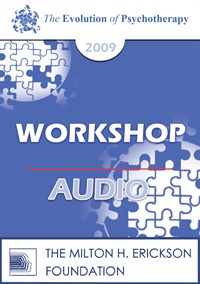
- Average Rating:
- Not yet rated
- Topic Areas:
- Emotionally Focused Therapy (EFT) | Workshops | Attachment | Psychotherapy
- Categories:
- Evolution of Psychotherapy | Evolution of Psychotherapy 2009
- Faculty:
- Sue Johnson, EdD
- Duration:
- 2 Hours 31 Minutes
- Format:
- Audio Only
- Original Program Date:
- Dec 10, 2009
- Short Description:
- This workshop will summarize the key conceptual underpinnings of EFT; the attachment perspective on the nature of love, and the integration of experiential and systemic perspectives that constitute the EFT theory of change. The basics of EFT practice and the steps of change will be outlined. Interventions will be illustrated with video tapes and transcripts. Exercises will be offered for play and practice. This workshop also will present more recent developments in EFT, including the EFT model of forgiveness.
- Price:
- $15.00 - Base Price
Please wait ...

